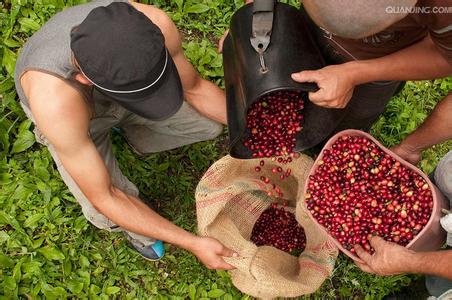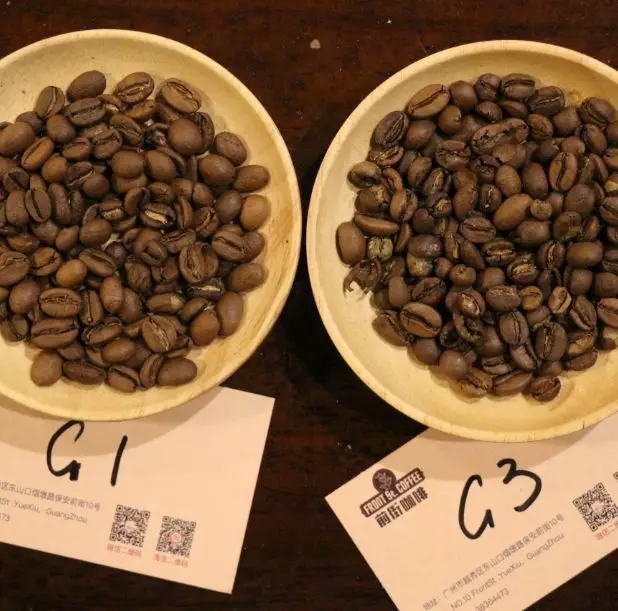Introduction to the taste of El Salvador Pacamara coffee beans by hand
Introduction to the taste of El Salvador Pacamara coffee beans by hand
1. Try to buy fresh coffee, usually one-way valve packaging, please pay attention to the production date on the packaging, of course, the closer to the purchase date, the better. It is recommended to buy half a pound of packaging, even if you need a pound of beans. Because it can prolong the shelf life of coffee properly without opening the package.
two。 Open coffee beans should be kept away from light in a sealed bottle, choose a sealed bottle with good sealing, and keep it in a place that avoids direct light source as far as possible. If your sealed bottle is transparent, dark paper can be used outside the sealed bottle.
3. Please don't keep the coffee beans in the refrigerator. This is not the right way. Too low temperature will lock up the aroma of coffee.
El Salvador boutique coffee is concentrated in the volcanic rock producing areas of Santa Ana in the west and Charantanan fruit in the northwest. In recent years, the top 10 cup tests are almost entirely from these two producing areas, with an altitude of about 9-1500 meters, mainly bourbon (68%). Followed by Pacas (29%), mixed-race Pakamara, Dulaai and Kaddura accounted for only 3%.
Salvadoran coffee ranks side by side with Mexico and Guatemala as the producers of Asa and Merdo, and is fighting for the top one or two places in China and the United States with other countries. The highlands of origin are large coffee beans of all sizes, which are fragrant and mild in taste. Like Guatemala and Costa Rica, coffee in El Salvador is graded according to altitude. The higher the altitude, the better the coffee. It is divided into three grades according to elevation: SHB (strictly high grown) = highlands, HEC (high grown central) = medium highlands, CS (central).
Standard) = lowland; the best brand is Pipil, the Aztec-Mayan name for coffee, which has been recognized by the American Society for Organic Certification (Organic Certified lnstitut eof America) that Salvadoran coffee is a specialty of Central America, where coffee is light, aromatic, pure and slightly sour. Like Guatemala and Costa Rica, coffee in El Salvador is graded according to altitude, and the higher the altitude, the better the coffee. The best brand is Pipil, which is what the Azbec-Mayan (AztecMayan) called coffee, which has been approved by the American Organic Certification Society (Organic Certified Institute of America). Another rare kind of coffee is Parkmara.

Important Notice :
前街咖啡 FrontStreet Coffee has moved to new addredd:
FrontStreet Coffee Address: 315,Donghua East Road,GuangZhou
Tel:020 38364473
- Prev

What is the difference in flavor between G1 and G2 in Yega Chenkee Cochel Solar?
Yega Chenkee Cochel Solar G1 and G2 in flavor difference lies in where to plant height: 1700m above sea level raw bean processing method: Dry Process solarization international score: 88.6baking degree: medium and shallow baking packaging: one-way valve Kraft paper (with zipper) packaging suggested using utensils: hand flushing, smart cup, American dripping filter, siphon, French pressure, love pressure, mocha pot and other appliances
- Next

A brief introduction to the flavor characteristics of Costa Rican Yersalo coffee
A brief introduction to the flavor characteristics of Costa Rican Yersalo Coffee the excellent Costa Rican coffee is called extra hard beans and can grow at an altitude of more than 1500 meters. Altitude has always been a problem for coffee growers. The higher the altitude, the better the coffee beans, not only because the higher altitude can increase the acidity of coffee beans and thus increase the flavor, but also because
Related
- Detailed explanation of Jadeite planting Land in Panamanian Jadeite Manor introduction to the grading system of Jadeite competitive bidding, Red bid, Green bid and Rose Summer
- Story of Coffee planting in Brenka region of Costa Rica Stonehenge Manor anaerobic heavy honey treatment of flavor mouth
- What's on the barrel of Blue Mountain Coffee beans?
- Can American coffee also pull flowers? How to use hot American style to pull out a good-looking pattern?
- Can you make a cold extract with coffee beans? What is the right proportion for cold-extracted coffee formula?
- Indonesian PWN Gold Mandrine Coffee Origin Features Flavor How to Chong? Mandolin coffee is American.
- A brief introduction to the flavor characteristics of Brazilian yellow bourbon coffee beans
- What is the effect of different water quality on the flavor of cold-extracted coffee? What kind of water is best for brewing coffee?
- Why do you think of Rose Summer whenever you mention Panamanian coffee?
- Introduction to the characteristics of authentic blue mountain coffee bean producing areas? What is the CIB Coffee Authority in Jamaica?

